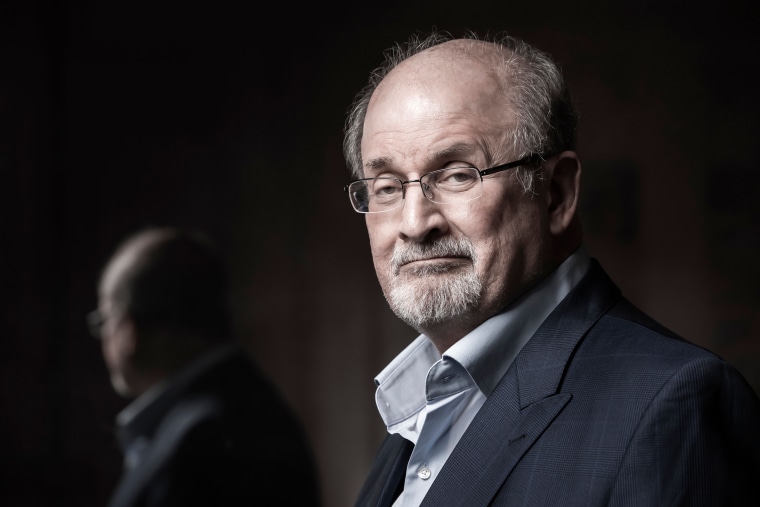Author Salman Rushdie, marking his return to the literary world after a violent attack last year that left him permanently injured, says he doesn't want pity.
“I’ve always tried very hard not to adopt the role of a victim,” he recently told New Yorker magazine editor David Remnick. The story marked Rushdie’s first interview since he was stabbed.
His reappearance as a public figure also included a recent real-life visit to the New York City office of his agent, Andrew Wylie; promotion for his new book, "Victory City," completed before the stabbing; and a vow to eschew feelings of bitterness six months after the attack in western New York.
In 1989, Rushdie defied advice to lie low after Iran's late supreme leader, Ayatollah Ruhollah Khomeini, put a virtual contract on his life in response to his novel "The Satanic Verses," which many Muslims found blasphemous or at least outrageously irreverent.
Rushdie has also expressed little desire to embrace a recluse's life after the midsummer violence at a public, outdoor discussion in Chautauqua, New York.
Yet he acknowledged the attack has caused him disruption and agony. Wylie has said Rushdie will not go on a book tour to promote the publication of "Victory City."
The violence unfolded quickly on Aug. 12 at the Chautauqua Institution, where Rushdie was seated onstage, awaiting the start of a discussion that was part of the Chautauqua Lecture Series.
A person dressed in black rushed the stage, and Rushdie was stabbed multiple times, authorities said. Wylie said afterward that Rushdie's injuries, including a punctured eye, a damaged liver and severed nerves, would be "life-changing."
He said Rushdie would probably lose the use of one eye, and today Rushdie wears glasses with a darkly tinted right lens in place of an eye patch. Although Rushdie's physiological recovery appears to be nearly completed, he indicated to The New Yorker that his mind still needs time.
“I’ve found it very, very difficult to write," Rushdie said. "I sit down to write, and nothing happens. I write, but it’s a combination of blankness and junk, stuff that I write and that I delete the next day. I’m not out of that forest yet, really.”
Rushdie spent six weeks in hospital rooms recovering, The New Yorker reported in its feature, published online Monday and scheduled for hard-copy release Feb. 13.
Suspect Hadi Matar, then 24, of Fairview, New Jersey, was arrested and has been awaiting trial on charges of second-degree attempted murder and, accused of attacking Chautauqua moderator Henry Reese, second-degree assault.
He pleaded not guilty.
Matar's attorney, Nathaniel L. Barone II, said he was reviewing the state's claims and preparing motions as part of what he said would be a "zealous defense."
"Mr. Matar, regardless of whom the alleged victim or victims may be, is no different from any other individual who is accused of a crime and is entitled to the full protection of the criminal justice process pursuant to his constitutional rights which include, with no limitations, his Presumption of Innocence as well as Due Process," Barone, the Chautauqua County chief public defender, said by email.
Rushdie said he hasn't second-guessed his lack of security that day. "I blame him," he told The New Yorker in reference to the suspect.
Rushdie, the product of a Muslim family in Bombay who sent him off to Cambridge for his education, was fairly quickly recognized as a literary star when his 1981 novel, "Midnight's Children," earned high critical praise and a Booker Prize.
Although he watched his back and used security after instances of riotous Muslim world responses to 1988's "The Satanic Verses," which included a Muhammad character portrayed as human and flawed, Rushdie over time rejected the idea of living in exile or fear.
Rushdie’s 16th novel, “Victory City,” appears to reprise his sharp, self-critical view of humanity. It's presented as the secret history of a circa-1500s empire of humanistic ideals, including gender equality, that it failed to realize. A New York Times review said it displays “haunting, uncanny, predictive power.”
After he moved to New York in 2000, with the virtual bounty of Khomeini's fatwa, or religious ruling, still over his head, Rushdie appeared to behave as if it had never happened, as he was spotted enjoying the city's restaurants and night life like any other celebrity.
The display of living well under a threat of death may have been a mistake, Rushdie told The New Yorker, because people seemed to hate it.
"Not only did I live but I tried to live well," he said. "Bad mistake."
The Chautauqua attack might have changed the world's opinion of him, he joked. "Get fifteen stab wounds, much better," he said.
He said he wants readers to receive him through his books and not consider how such a traumatic event would scar his life's timeline, even as he admitted the incident has tested his resolve.
"You’re just sitting there saying, 'Somebody stuck a knife in me! Poor me,' which I do sometimes think," Rushdie said. "It hurts. But what I don’t think is: That’s what I want people reading the book to think. I want them to be captured by the tale, to be carried away.”
He seems determined to keep digging into his soul for his next novel. The voices of his characters, he has said, emerge in time.
"All I can do is this," he said. "As long as there’s a story that I think is worth giving my time to, then I will."

